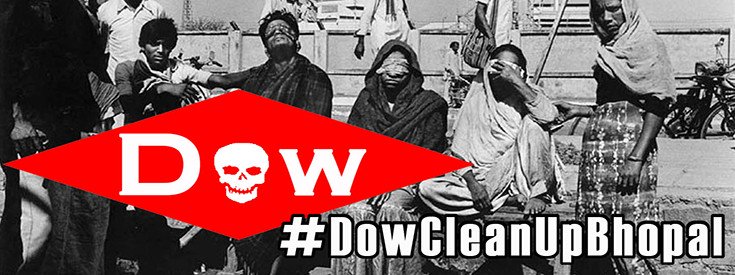Breaking: Dow Going to Criminal Court in Bhopal 31 Years After Chemical Explosion

The Dow Chemical Company is ranked the second largest toxic waste producer in the United States. In an average year, it dumps more than 600 million pounds of toxic chemical waste on the nation. Though the company has yet to face criminal charges in the US, Dow will be forced to make an appearance in court in Bhopal. Dow faces criminal charges for the 1984 Bhopal Gas Disaster by its wholly-owned subsidiary the Union Carbide Corporation (UCC).
Dow has ignored three consecutive criminal court summons issued previously since July of 2013.
Aruna Chandrasekhar, Business and Human Rights Officer at Amnesty International India, said:
“We hope that the Indian and US governments have done their part to ensure that Dow complies with an official Indian court order. . .Dow must stop dodging the Indian justice system and ignoring survivors who have suffered from the toxic fallout of the disaster for over three decades now.”
It is only through the actions of the Bhopal Group for Information and Action, and not the Central Bureau of Investigation (CBI), that Dow is being prosecuted, according to Satinath Sarangi:
“Tomorrow we will see whether the CBI helplessly watches Dow Chemical ignore Court’s order a third time, or whether it summons the courage to take effective legal action against the criminal corporation.” he said.
Dow has tried to distance itself from the disaster, though it had total control over Union Carbide after its acquisition of the company in 2001. Union Carbide also has a controlling interest in India Limited, the operator of the pesticide factory at the time of the Bhopal Disaster. So though it can be difficult to untangle the corporate tentacles, Dow Chemical is clearly liable for the incident.
Dow refuses to acknowledge any responsibility so far as any reparations toward the legacy of the disaster are concerned. Thirty-one years ago, the state capital of Madhya Pradesh experienced the world’s worst industrial accident when a Union Carbide pesticide plant exploded, sending 42 tonnes of poison, methyl isocyanate, into the air and down into the slums next to the factory, burning the eyes and lungs of residents.
Sources:
Featured image credit: from Bhopal.org
